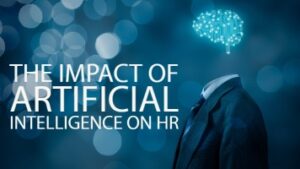Artificial intelligence (AI) has the potential to transform every aspect of our lives, including how we work. The Human Resources (HR) field isn’t immune to this change. While human resources still requires a human touch, many manual tasks can be automated or optimized to help employees focus on other high-value tasks. Research indicates that most HR professionals are not fearful of this new technology but rather excited about AI’s possibilities. An Oracle Future Workplace report suggests that most HR professionals are open to incorporating AI.
How AI Helps HR Professionals Work Smarter, Not Harder
Almost nine out of ten companies are investing in AI, regardless of industry. The impact of AI on HR is significant, as it can help make HR processes more efficient, effective, and personalized. A study published in the International Research Journal of Engineering and Technology illustrates that integrating AI into human resources practices can improve organizations by analyzing, predicting, and diagnosing information for better decision-making, free from personal bias. Here are some HR tasks AI is well suited for.
AI & Recruitment
AI can make recruitment easier by automating many initial steps, such as reaching out to potential employees, scanning and selecting resumes, scheduling interviews, and assessing candidates’ competencies.
In addition to making recruitment easier, AI can help eliminate hiring bias. By removing human decision-making from certain stages of recruitment, such as initial resume screening, AI can reduce the impact of unconscious biases that may exist in HR teams. This can lead to a more diverse and inclusive workplace, benefitting the organization significantly.
Finally, AI can help to identify top performers and high-potential employees, which can aid in talent development and succession planning.
Employee Experience Automation
AI in HR can help onboard new employees by automating tasks such as document verification, scheduling initial meetings, and handling administrative tasks.
Artificial intelligence can assist with employee experience management by identifying patterns and trends that indicate employee dissatisfaction or disengagement. This can enable HR teams to address these issues and prevent turnover proactively.
Training & Development
In training and development, AI can create customized training programs for employees based on their skills and requirements, suggest courses to fill gaps in skills, and match new projects with employees who have completed required courses.
Artificial intelligence can create simulations and virtual reality experiences to enhance learning and provide a more immersive training experience. With the help of AI, organizations can ensure that their employees receive the necessary training to enhance their skills and improve performance, leading to better productivity and increased job satisfaction.
Retention
Rewards and recognition are essential factors that help to increase employee engagement, and AI in HR can help to create unique tools and systems to automate milestone awards and other regular recognition processes.
AI can identify and analyze the factors contributing to employee engagement, such as job satisfaction, work-life balance, and team dynamics. Teams can use this information to design and implement targeted engagement initiatives, which can help to improve employee satisfaction and retention.
Responses On Auto-Pilot
AI can also help with managing employee inquiries. AI-powered chatbots and virtual assistants provide employees personalized support and assistance by answering their questions about benefits, career development, and company policies.
AI-powered chatbots and virtual assistants can also be available 24/7, providing employees immediate support, even outside standard office hours. This can increase employee satisfaction and engagement, as they feel supported and heard by their organization.
AI-powered chatbots and virtual assistants significantly reduce HR professionals’ workload by handling repetitive and time-consuming inquiries. This enables HR teams to focus on more strategic and value-adding activities. By reducing the burden of mundane tasks, automation can also help prevent burnout among HR professionals, a common industry issue.
Utilizing Artificial Intelligence
Effectively utilizing AI in HR management involves leveraging AI software to analyze collected data while allowing human staff to make the final decision. Assessing the areas where AI could add value before integrating it into operations is essential. If the main goal is to enhance the employee experience, it has the potential to improve productivity and reduce operational costs.
Additionally, using unbiased AI technology that doesn’t perpetuate discrimination is crucial. Regular audits and assessments of the AI algorithms can prevent unintentional biases in HR processes.
Lastly, it is essential to properly train HR staff to work alongside AI systems and ensure that the AI technology used aligns with the company’s values and culture. Effective communication with employees is also necessary to alleviate concerns about job displacement due to the integration of AI technology in HR operations. By considering these factors, AI can be a valuable tool in HR management and contribute to the organization’s overall success.
Bottom Line
From recruitment to onboarding and training, AI has the potential to enhance the efficiency and effectiveness of HR operations. With AI freeing HR professionals to focus on more complex and strategic tasks, organizations can improve their overall performance, increase productivity, and reduce costs.
As technology evolves, HR teams must stay up-to-date on the latest developments and embrace AI’s potential benefits. Ultimately, the integration of AI into HR is not about replacing humans but rather augmenting their capabilities to make more informed decisions and create a more positive employee experience.

